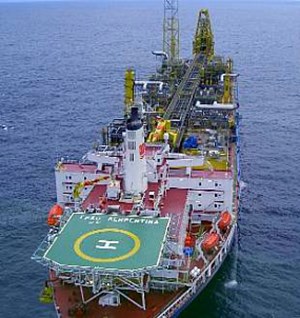Equatorial Guinea targets offshore oil and gas engineers as oil production drops 20% from peak on leadership problems
(Bloomberg) – Two South African engineers working in Equatorial Guinea’s offshore oil fields were preparing to return home in February 2023 when they were arrested for cocaine trafficking and thrown in jail, charges which the men and their families deny.
People familiar with the matter who declined to be identified due to the sensitivity of the situation described the arrests — the first involving foreigners in the country’s critical oil sector — as the latest example of Vice President Teodoro Nguema Obiang Mangue’s (“Teodorin”) impulsive behavior, which threatens the long-term stability of the Central African state that has been ruled by his father for the past 45 years.
Once reliant on cocoa and coffee as main sources of revenue, the discovery of offshore oil in the 1990s made Equatorial Guinea massively wealthy. Yet since the height of the early 2000s oil boom, when international oil workers lived in luxurious homes and had food imported from Europe, the smallest OPEC member’s overall crude production has dropped to roughly a fifth of what it was at its peak.
The country’s economic growth is forecast to decline 5.5% this year, making it the world’s worst-performing economy, according to available IMF data. And after nearly three decades in Equatorial Guinea, Exxon Mobil Corp. is planning to pull out entirely, a decision the company says is part of a long-term strategy.
With a void to fill after the departure of its biggest investor, the growing severity and frequency of Teodorin Obiang’s outbursts puts the tiny country’s future in greater doubt than ever. Equatorial Guinea’s Oil Ministry, Foreign Ministry, the country’s embassy in South Africa and the Office of the Vice President did not respond to requests for comment.
The detention of the South African engineers is the most recent example of retributive actions occurring on Equatoguinean soil shortly after Teodorin has been disciplined abroad.
The men had been working on Exxon and Chevron production vessels off the coast of the country when Obiang lost a court case in South Africa and had two of his properties in Cape Town seized, along with the 67-meter yacht.
Days after the ruling, Peter Huxham, 55, and Frederik Potgieter, 54, were arrested.
Although both Huxham and Potgieter worked for the same Dutch oil services company, the men had never met before SBM Offshore booked them into the same hotel ahead of their flights back to South Africa.
Huxham had a sinking feeling when he was summoned to reception. He was being accused of something, but he couldn’t tell what. “Something terrible has happened,” he told his fiancée in a phone call shortly before his arrest.
The men were in short order convicted of drug trafficking, sentenced to 12 years in prison and fined $5 million each. They were initially held at Black Beach, a Spanish colonial-era prison where the president’s uncle, who’d led a brutal dictatorship, was detained before being executed by firing squad.
The engineers have since been transferred to a jail on the mainland for political prisoners. Huxham’s fiancée has spoken to him three times since he was arrested a year ago, and Potgieter’s wife has spoken to her husband only twice. South Africa’s Department of International Relations said when asked to comment that it has been engaging with the government of Equatorial Guinea and held meetings about the matter in March.
Chevron unit Noble Energy EG Ltd. said in a statement that it is “aware of the detention in Equatorial Guinea of two employees of SBM Offshore,” adding that it “remains committed to the rule of law and ethical business standards in its operations.”
Exxon has “supported SBM in their efforts to care for Peter and Frik, who are both SBM employees,” the company said in a statement. “These are sensitive matters, and we don’t comment on details involving employees of other companies.”
The Texas oil giant is currently transferring its Equatorial Guinea assets to the government as it exits the country after nearly three decades.
“Doing business in Equatorial Guinea has never been easy due to reputational risks posed by a kleptocratic and authoritarian regime,’’ said Maja Bovcon, an independent Africa analyst. “Recent retributive measures against businesses hailing from nations that have either legally or materially challenged Teodorin hint at an increasingly challenging business environment under his anticipated leadership.”
Officials in Equatorial Guinea didn’t respond to emailed questions about the men, but its oil ministry said last month that it will take over production of Exxon’s field and invited American companies to increase their presence.
“The government has always expressed its willingness to privilege their positive action in the country’s economy,” the ministry said, adding that China is an ongoing partner in building the country’s infrastructure.
“Until the Equatorial Guinea government is satisfied, our guys are not going to get out,” said Shaun Murphy, a spokesperson for the Potgieter family. “We have absolutely no control over it.”



